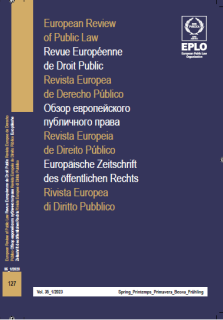
From Root Causes to Solution, the Driving Force of SCP,
Our Consumption and Production Patterns
While local and global geopolitics keep on discussing about sustainability, and the legal framework is adjusting to the needs, three key issues are driving everything we have today around sustainability: poverty eradication, management of natural resources and changing our unsustainable consumption and production patterns. In general, the global public law framework has difficulties in following with quick and actionable measures, further complicated by the appetite for growth and limited sense of responsibility for Common Goods. Switching to sustainable consumption and production/ SCP is critical to an effective transition to low-carbon, circular economy and sustainable development. Ensuring SCP has been and still is one of the greatest challenges over the last 50 years, because of its complexity, involvement of all stakeholders and needs for system thinking, as well as a major challenge for public law. Particular attention should be devoted to Small and Medium Enterprises, the breeding ground for eco-innovation, as well as to appropriate public procurement policies. Change will not occur by force and law. It should be voluntary and well understood to have a chance to deliver. And the public law system has a major role to play, it has a critical responsibility in accompanying the switching to SCP throughout the transition to low-carbon and circular economy in the search of sustainability.
Alors que les géopolitiques locaux et mondiaux continuent de discuter de la durabilité et que le cadre juridique s’adapte aux besoins, trois questions clés sont à l’origine de tout ce que nous faisons aujourd’hui autour de la durabilité: l’éradication de la pauvreté, la gestion des ressources naturelles et le changement de nos modes de consommation et de production non durables. En général, le cadre du droit public mondial a du mal à suivre en prenant des mesures rapides et applicables, et cela se complique encore du fait de l’appétit de croissance et du sens limité de la responsabilité envers les biens communs. Le passage à des modes de consommation et de production durables est essentiel pour une transition efficace vers une économie circulaire à faible émission de carbone et vers un développement durable. Garantir des modes de consommation et de production durables a été et reste l’un des plus grands défis de ces cinquante dernières années, en raison de la complexité du problème, de l’implication de toutes les parties prenantes et de la nécessité d’une réflexion systémique, et c’est aussi un défi majeur pour le droit public. Une attention particulière doit être accordée aux petites et moyennes entreprises, qui constituent le terreau de l’éco-innovation, ainsi qu’à des politiques de marchés publics appropriées. Le changement ne se fera pas par la force et la loi. Il doit être volontaire et bien compris pour avoir une chance d’aboutir. Et le système de droit public a un rôle majeur à jouer, il a une responsabilité cruciale dans l’accompagnement du passage à la consommation et à la production durables tout au long de la transition vers une économie circulaire et à faible émission de carbone, dans la recherche de la durabilité.





















